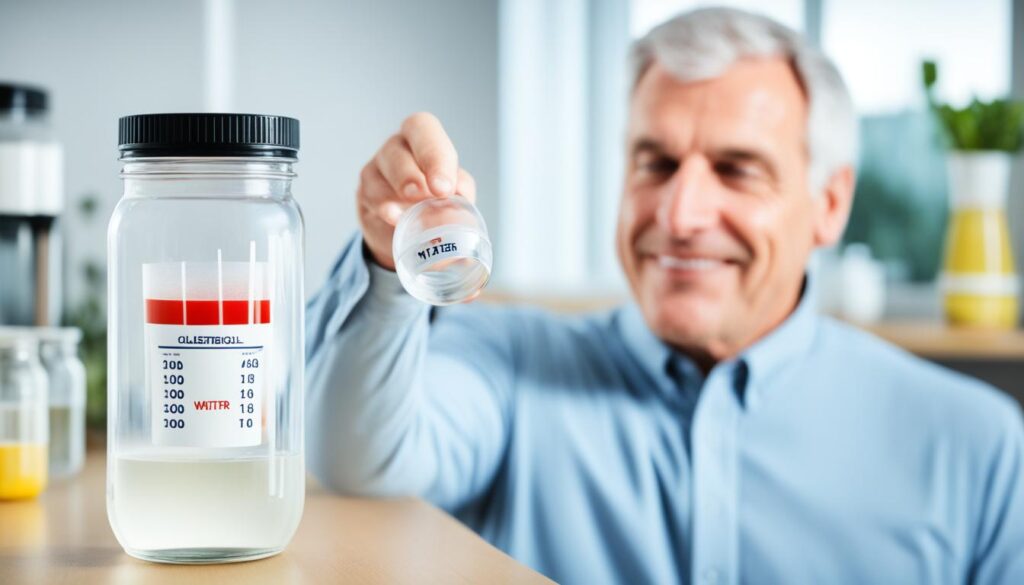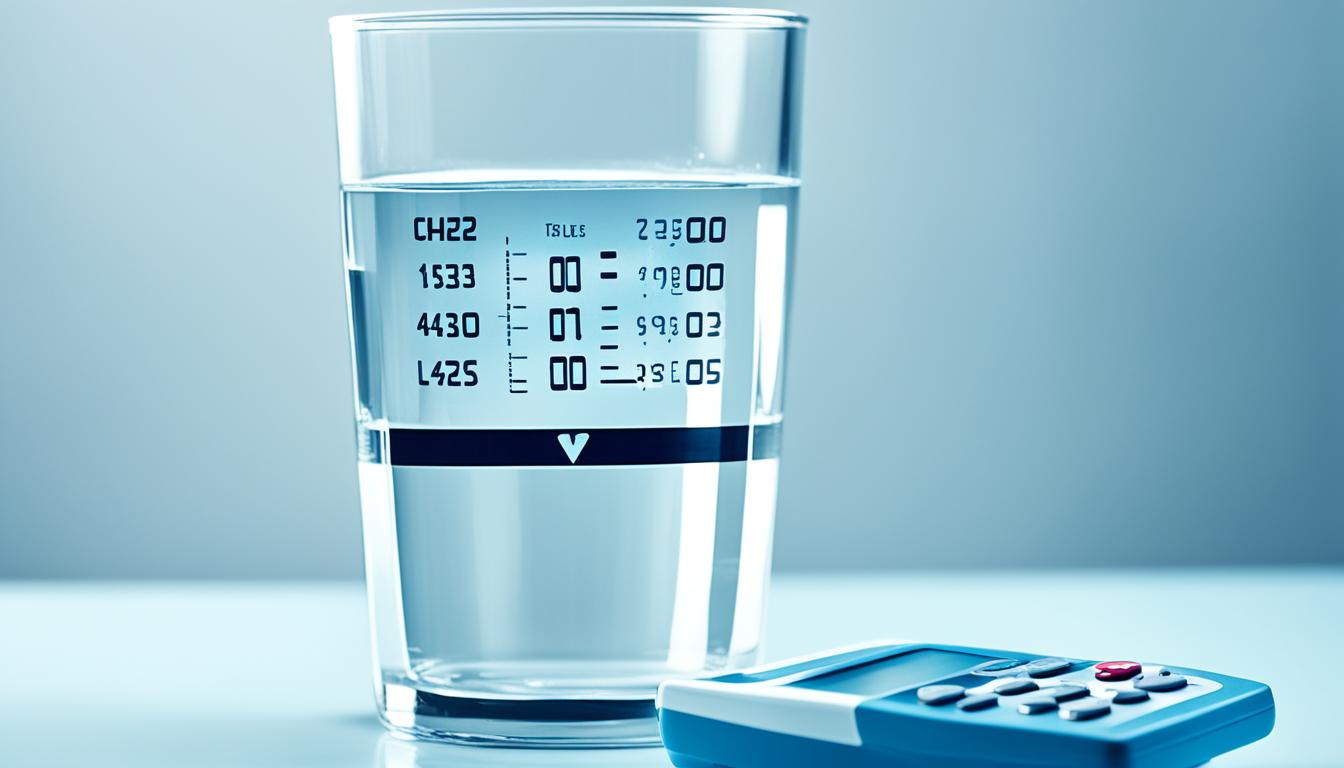Water fasting has been a topic of interest in exploring its potential benefits for cholesterol levels. Research has delved into the impact of water fasting on total serum cholesterol, including both LDL cholesterol (commonly known as “bad” cholesterol) and HDL cholesterol (commonly known as “good” cholesterol).
Recent studies have shown that a 24-hour water-only fast can result in an acute increase in total serum cholesterol. In a study presented at the 2011 American College of Cardiology meeting, it was observed that total serum cholesterol increased by 9.5 mg/dL after the fast. These findings suggest that water fasting may lead to temporary changes in cholesterol levels.
To dive deeper into how water fasting impacts cholesterol and its potential benefits, let’s explore the mechanisms behind this phenomenon.
Key Takeaways:
- Water fasting may result in a temporary increase in total serum cholesterol levels, including LDL and HDL cholesterol.
- Research suggests that water fasting affects the liver’s uptake and excretion of cholesterol, potentially using it for energy.
- Fasting may also increase human growth hormone levels, which can facilitate the breakdown of fats and impact insulin resistance and metabolic risk.
- Water fasting has been found to affect various lipids in the body, including LDL cholesterol, HDL cholesterol, and triglyceride levels.
- While water fasting may show promise for heart health, further research is needed to fully understand its long-term effects and optimal duration and frequency.
(In 5-7 succinct bullet points):
1. A 24-hour water-only fast can temporarily increase total serum cholesterol levels.
2. Water fasting may affect the liver’s cholesterol regulation and utilize it for energy.
3. Increased levels of human growth hormone during fasting can facilitate fat breakdown.
4. Water fasting has been found to impact the levels of LDL cholesterol, HDL cholesterol, and triglycerides.
5. Further research is needed to determine the long-term effects of water fasting on cholesterol and heart health.
How Water Fasting Impacts Cholesterol
The exact mechanisms through which water fasting impacts cholesterol are not fully understood. However, it is hypothesized that during a fast, the liver stops taking up and excreting cholesterol, potentially using it for energy. Additionally, the levels of human growth hormone (HGH) have been found to increase during fasting. HGH helps preserve lean muscle mass while increasing lipolysis, the breakdown of fats. This suggests that fasting may lead to the burning of adipocytes (fat cells) for energy and potentially impact insulin resistance and metabolic risk. Further research is needed to fully understand the specific mechanisms by which water fasting impacts cholesterol levels.
By temporarily altering the body’s metabolic processes, water fasting may have a short-term impact on cholesterol levels. However, the long-term effects and sustainability of these changes remain to be fully explored. It is important to approach water fasting with caution and under the guidance of a healthcare professional, especially for individuals with existing health conditions or those taking medication to manage cholesterol levels.

While water fasting may show promise as a potential strategy for lowering cholesterol, it is not a standalone solution and should be considered as part of an overall healthy lifestyle plan. Incorporating other dietary and lifestyle changes, such as reducing saturated fats, increasing fiber intake, and engaging in regular physical activity, can also help manage cholesterol levels and promote heart health. It is always best to consult with a healthcare professional before making any significant changes to your diet or exercise routine.
Water Fasting and Lipid Profile
In addition to its impact on total serum cholesterol, water fasting has been found to affect other components of the lipid profile. A study presented at the 2011 American College of Cardiology meeting found that LDL cholesterol levels rose by 23.1 after a 24-hour water-only fast, while HDL cholesterol levels rose by 3.7. Triglyceride levels decreased by 52.4 after fasting. These findings suggest that water fasting may have a complex impact on various lipids in the body.

To further illustrate the changes in the lipid profile during water fasting, the following table provides a summary of the study’s findings:
| Lipid Component | Change after 24-hour Water Fasting |
|---|---|
| LDL Cholesterol | Rose by 23.1 |
| HDL Cholesterol | Rose by 3.7 |
| Triglycerides | Decreased by 52.4 |
These findings indicate that water fasting can lead to alterations in LDL and HDL cholesterol levels, as well as triglyceride levels. However, it is important to note that this study only examined the short-term effects of water fasting on the lipid profile. Further research is needed to fully understand the long-term effects and benefits of water fasting for individuals with high cholesterol.
Water Fasting and Heart Health
Studies have shown that water fasting may have potential benefits for heart health. In a 2011 study, researchers observed that fasting for 24 hours led to a decrease in weight and glucose levels. This suggests that water fasting could have positive effects on weight management and blood sugar control, both of which are important factors for heart health.
Additionally, fasting has been associated with increased levels of human growth hormone (HGH). HGH plays a crucial role in regulating various physiological processes, including metabolism, cell repair, and cardiovascular function. The protective effects of HGH on the heart may help reduce the risk of cardiovascular diseases.
However, it is important to note that the effects of water fasting on heart health and specific cardiovascular disease risk factors require further research. More studies are needed to determine the optimal duration and frequency of fasting, as well as its potential long-term impact on heart health.
If you’re considering water fasting as part of your health regimen, it’s always best to consult with a healthcare professional, especially if you have any existing heart conditions or concerns.
Additional Tips for a Healthy Heart:
- Eat a balanced diet rich in fruits, vegetables, whole grains, and lean proteins.
- Limit your intake of saturated fats, trans fats, and processed foods.
- Engage in regular physical activity to maintain a healthy weight and strengthen your cardiovascular system.
- Manage stress through techniques like meditation, deep breathing exercises, or engaging in activities you enjoy.
- Monitor your blood pressure and cholesterol levels regularly, and follow your healthcare provider’s recommendations for managing them.
Comparison of Heart Health Factors
| Factor | Water Fasting | Healthy Diet | Physical Activity | Stress Management |
|---|---|---|---|---|
| Weight Management | Potential decrease | Promotes weight loss | Promotes weight loss | Does not directly impact weight |
| Blood Sugar Control | Potential improvement | Helps maintain stable blood sugar levels | Aids in insulin sensitivity | May help lower stress-related blood sugar spikes |
| Cardiovascular Function | Requires further research | Can improve heart health | Strengthens the heart and blood vessels | Reduces the impact of stress on the heart |
“A healthy heart is the foundation for overall well-being. While water fasting may offer potential benefits for heart health, it’s crucial to approach any dietary or fasting regimen with caution and seek professional advice.”
Conclusion
In conclusion, water fasting has shown potential for impacting cholesterol levels, with a temporary increase observed after a 24-hour water-only fast. It may also have effects on other lipid components and heart health markers. However, the exact mechanisms and long-term effects of water fasting on cholesterol and heart health are still being studied.
It is important to consult with a healthcare professional before embarking on a water fasting regimen, especially if you have any existing health conditions. While water fasting may offer some benefits for cholesterol reduction, there are also other dietary and lifestyle changes that can help lower cholesterol levels and promote heart health. For example, reducing saturated fats, increasing fiber intake, and regular exercise have been shown to be effective strategies.
It’s crucial to note that water fasting should not be the sole approach to managing cholesterol and heart health. A comprehensive approach that combines healthy eating, regular physical activity, and medical guidance is the best way to achieve lasting results. If you are considering water fasting or any other lifestyle modification for cholesterol reduction, it is always recommended to seek advice from a healthcare professional for personalized recommendations and guidance.




